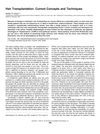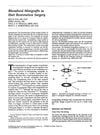 22 citations,
July 2017 in “BMC complementary and alternative medicine”
22 citations,
July 2017 in “BMC complementary and alternative medicine” Natural remedies for hair and scalp issues are still widely used in Palestine.
 43 citations,
January 2013 in “Indian Journal of Dermatology, Venereology and Leprology”
43 citations,
January 2013 in “Indian Journal of Dermatology, Venereology and Leprology” The article concludes that advancements in hair cosmetics require dermatologists to stay informed about products and their potential risks, including allergies and higher risks for hairdressers.
 February 2024 in “International Journal of Progressive Research in Engineering Management and Science”
February 2024 in “International Journal of Progressive Research in Engineering Management and Science” The herbal shampoo is safe, effective, and helps treat hair loss.
 9 citations,
May 2005 in “Facial plastic surgery”
9 citations,
May 2005 in “Facial plastic surgery” Laser hair removal can be safe and effective for dark-skinned individuals with the right laser settings.
 15 citations,
September 2006 in “Journal of International Medical Research”
15 citations,
September 2006 in “Journal of International Medical Research” Nourkrin® significantly increased hair growth and was well-tolerated by people with hair loss.
 January 2022 in “Clinical Cases in Dermatology”
January 2022 in “Clinical Cases in Dermatology” Some hair loss from medication may reverse after stopping the drug, but treatment options are limited and ongoing research is needed.
 9 citations,
June 2008 in “Springer eBooks”
9 citations,
June 2008 in “Springer eBooks” Understanding hair follicle structure is key for treating hair disorders and could help develop new treatments.
 19 citations,
January 2015 in “Skin Pharmacology and Physiology”
19 citations,
January 2015 in “Skin Pharmacology and Physiology” Minoxidil foam effectively promotes hair growth and reduces hair loss in men.
 25 citations,
August 2021 in “Irish Journal of Medical Science (1971 -)”
25 citations,
August 2021 in “Irish Journal of Medical Science (1971 -)” COVID-19 infection can significantly cause temporary hair loss.
 December 2023 in “Journal of family medicine and primary care”
December 2023 in “Journal of family medicine and primary care” Many people in Saudi Arabia experienced hair loss after COVID-19, especially women, those treated with antivirals, and those with a history of hair shedding.
 13 citations,
December 2017 in “Archives of Medical Sciences”
13 citations,
December 2017 in “Archives of Medical Sciences” Rivaroxaban can cause liver injury, allergic reactions, blood vessel inflammation, and hair loss, but these side effects are rare.
 January 2024 in “Journal of Evidence-Based Integrative Medicine”
January 2024 in “Journal of Evidence-Based Integrative Medicine” Teak leaf extract may effectively and safely promote hair growth in males with androgenic alopecia.
 January 2023 in “International Journal for Research in Applied Science and Engineering Technology”
January 2023 in “International Journal for Research in Applied Science and Engineering Technology” Herbs like Tea Tree Oil and Aloe Vera could be safer, more conditioning antidandruff alternatives to synthetic products.
 1 citations,
August 2012 in “Journal of acupuncture and meridian studies”
1 citations,
August 2012 in “Journal of acupuncture and meridian studies” Traditional Korean medicine combined with modern technology may improve hair removal treatments.
 5 citations,
September 2012 in “Dermatology Online Journal”
5 citations,
September 2012 in “Dermatology Online Journal” Follicular Unit Extraction (FUE) hair transplant is less invasive, leaves no scars, and has quicker recovery times, but it's more time-consuming and challenging. Automation helps speed up the process and improve graft survival, reducing the need for traditional strip surgery.
 May 2024 in “Research Square (Research Square)”
May 2024 in “Research Square (Research Square)” Many women in Northern Ghana use plant-based cosmetics like shea butter, and their use is more related to being married than to their job, education, or house.
 December 2022 in “BMC women's health”
December 2022 in “BMC women's health” The CNC® prosthetic system improved body image in breast cancer patients with hair loss from chemotherapy but did not significantly change their psychological wellbeing.
 March 2024 in “Journal of animal science/Journal of animal science ... and ASAS reference compendium”
March 2024 in “Journal of animal science/Journal of animal science ... and ASAS reference compendium” Soy hull supplementation did not affect sheep gastrointestinal parasite infection compared to corn-based supplements.
 1 citations,
July 2023 in “Chinese Medicine”
1 citations,
July 2023 in “Chinese Medicine” Shi-Bi-Man, a Traditional Chinese Medicine, helps grow hair by boosting lactic acid metabolism and activating hair follicle stem cells.
 30 citations,
October 2005 in “Journal of Investigative Dermatology Symposium Proceedings”
30 citations,
October 2005 in “Journal of Investigative Dermatology Symposium Proceedings” The document concludes that hair transplantation is recommended for those not helped by medical treatments, but warns that high-density transplants may lower hair survival rates.
 April 2023 in “Nigerian Journal of Clinical Practice”
April 2023 in “Nigerian Journal of Clinical Practice” Hair loss in adults is linked to heart disease risk factors like unhealthy blood fats, lack of exercise, and alcohol use. It's also slightly more common in people with metabolic syndrome. As people age, hair loss gets worse. In men, severe hair loss is tied to high blood pressure and a larger waist. In women, it's tied to higher body weight. People with hair loss should be checked for unhealthy blood fats and advised to avoid alcohol and inactivity.
 October 2023 in “Clinical, Cosmetic and Investigational Dermatology”
October 2023 in “Clinical, Cosmetic and Investigational Dermatology” Supplemented Erzhi Wan may help regrow hair in male pattern baldness by affecting certain cell signaling pathways.
 March 2024 in “Revista Agraria Academica”
March 2024 in “Revista Agraria Academica” The Mediterranean dwarf palm has medicinal, nutritional, and craft uses, but more research is needed.
 36 citations,
October 2016 in “Medical mycology”
36 citations,
October 2016 in “Medical mycology” PCR-ELISA is better for identifying the fungus causing scalp infections in Ugandan children than traditional methods.
 153 citations,
October 2007 in “Cell Stem Cell”
153 citations,
October 2007 in “Cell Stem Cell” New research suggests that skin cell renewal may not require a special type of cell previously thought to be essential.
 33 citations,
June 2007 in “International Journal of Pharmaceutics”
33 citations,
June 2007 in “International Journal of Pharmaceutics” The conclusion is that measuring how drugs partition into artificial sebum is important for predicting their delivery into hair and sebaceous follicles, and it provides better information than traditional methods.
 2 citations,
January 2011 in “Lecture Notes in Computer Science”
2 citations,
January 2011 in “Lecture Notes in Computer Science” A proposed robotic system could make hair harvesting for baldness treatment faster and more precise.
 June 2022 in “International Journal of Advanced Research in Science, Communication and Technology”
June 2022 in “International Journal of Advanced Research in Science, Communication and Technology” Multivitamin gummies with various vitamins and minerals offer a tasty and easy-to-digest alternative to traditional supplements.
 19 citations,
September 2004 in “Reviews in gynaecological practice”
19 citations,
September 2004 in “Reviews in gynaecological practice” Effective hirsutism management requires identifying the cause, combining new and traditional treatments, and setting realistic expectations for patients.
 2 citations,
May 1998 in “Dermatologic Surgery”
2 citations,
May 1998 in “Dermatologic Surgery” Rhomboid-shaped minigrafts, measuring 1.5 x 1.5 mm, lead to fewer complications and better results in hair restoration surgery compared to square or rectangular ones.






























